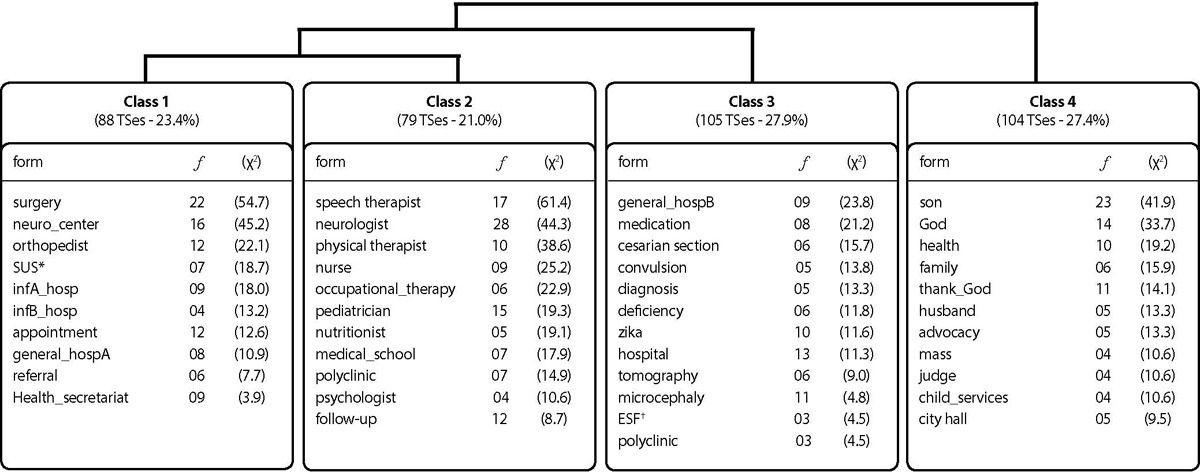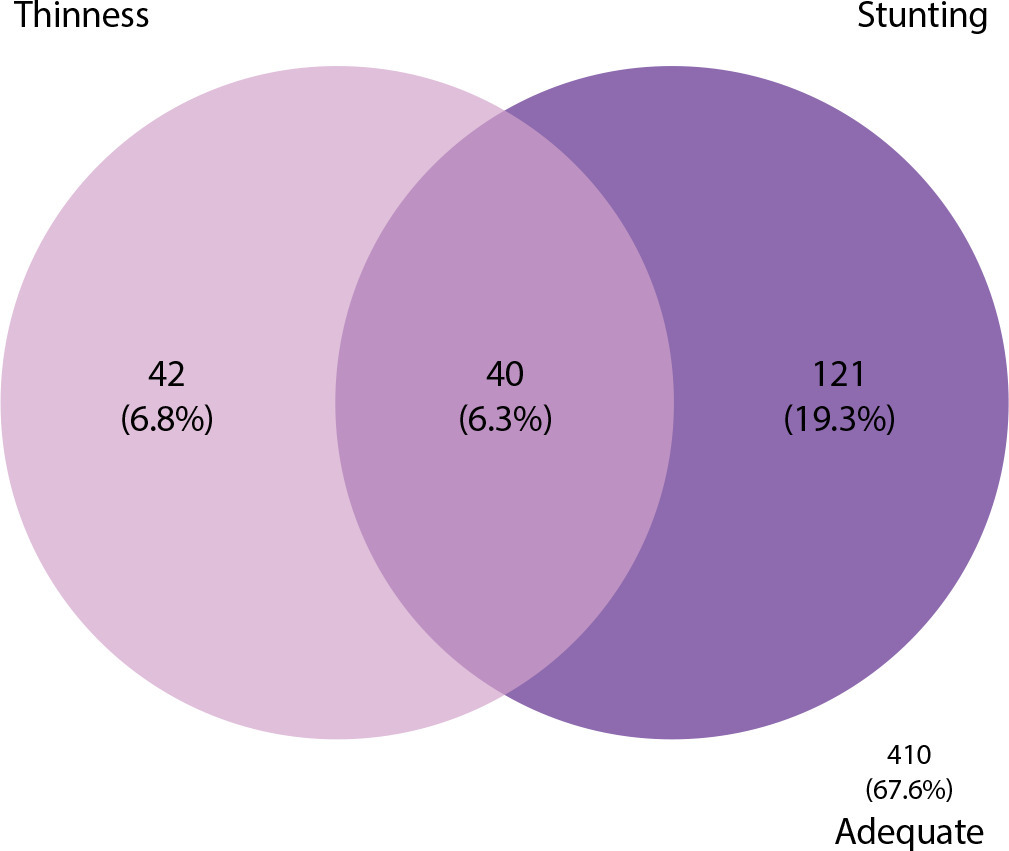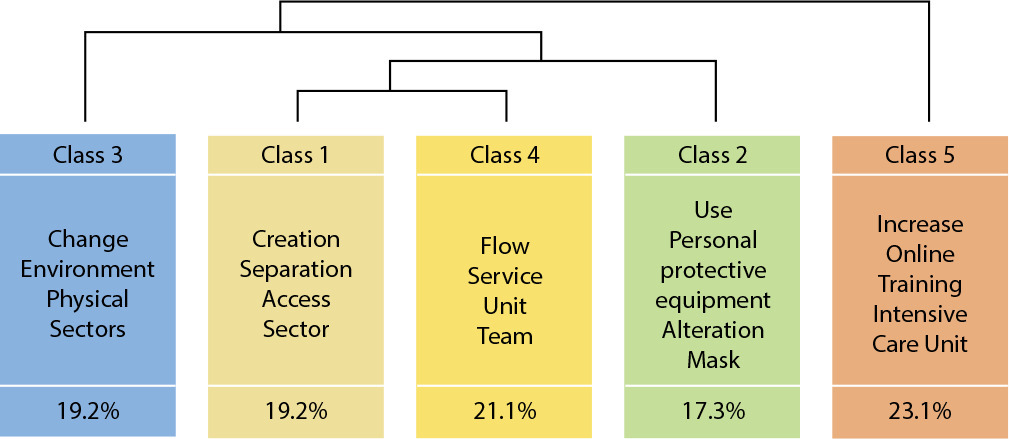-
ORIGINAL ARTICLE11-29-2022
Outlining the therapeutic itineraries of children with disabilities in the professional health care subsystem
Revista Brasileira de Enfermagem. 2022;75(3):e20210169
Abstract
ORIGINAL ARTICLEOutlining the therapeutic itineraries of children with disabilities in the professional health care subsystem
Revista Brasileira de Enfermagem. 2022;75(3):e20210169
DOI 10.1590/0034-7167-2021-0169
Views0See moreABSTRACT
Objectives:
to identify the outlining of therapeutic itineraries of families of children with disabilities in the professional health care subsystem.
Methods:
qualitative research carried out in two specialized services in the state of Ceará, with 41 family members interviewed using the life path technique and reports submitted to descending hierarchical classification and similitude analysis, with the help of the IRaMuTeQ software and the theoretical framework of health care systems.
Results:
the classes described the families’ itineraries in five paths, related to faith, support structures, medical behaviors, professionals, and health services. The professional subsystem stood out as deficient in outlining the therapeutic itinerary for access to health care for children with disabilities, without promoting integration between services in the Care Network.
Final considerations:
the families’ therapeutic itineraries showed homogeneous discourse with themes related to the care of professionals and spiritual aspects.

-
ORIGINAL ARTICLE11-29-2022
Undernutrition and associated factors in primary schoolchildren in Lokossa, Benin: a cross-sectional study
Revista Brasileira de Enfermagem. 2022;75(3):e20210254
Abstract
ORIGINAL ARTICLEUndernutrition and associated factors in primary schoolchildren in Lokossa, Benin: a cross-sectional study
Revista Brasileira de Enfermagem. 2022;75(3):e20210254
DOI 10.1590/0034-7167-2021-0254
Views1See moreABSTRACT
Objectives:
to estimate the prevalence of stunting and thinness and sociodemographic, household, family, dietary, and scholar associated factors in schoolchildren living in Lokossa-Benin.
Methods:
a survey conducted in a probabilistic sample (n=615) of primary schoolchildren (8-17 years), from 12/2018 to 01/2019, using structured questionnaire and 24-hour dietary recall. Thinness and stunting were defined as Height-for-age and Body Mass Index-for-age below-2 standard deviations, respectively. Associations were estimated by chi-square test and logistic regression.
Results:
thinness and stunting prevalence was 13.1% (95%CI:9.0-18.7) and 25.5% (95%CI:20.6-31.2), respectively. Odds of thinness were higher among older schoolchildren and those who experienced hunger at school. Odds of stunting increased with age, low diet diversity, experiencing hunger at school, and having school meal five days a week (OR:2.09; 95%CI:1.29-3.36).
Conclusions:
stunting was the most common problem. Older schoolchildren and those with food deprivation or poor diet diversity were the most affected.

-
ORIGINAL ARTICLE11-29-2022
Factors associated with bronchopulmonary aspiration: a national-based study
Revista Brasileira de Enfermagem. 2022;75(3):e20210220
Abstract
ORIGINAL ARTICLEFactors associated with bronchopulmonary aspiration: a national-based study
Revista Brasileira de Enfermagem. 2022;75(3):e20210220
DOI 10.1590/0034-7167-2021-0220
Views0See moreABSTRACT
Objectives:
to determine the prevalence of bronchopulmonary aspiration in the Brazilian scenario, the factors associated with the incident and the variables associated with death.
Methods:
a cross-sectional and analytical study, carried out from analysis of notifications of incidents related to bronchopulmonary aspiration of the Health Surveillance Notification System, from January 2014 to December 2018.
Results:
of the 264,590 notifications, 553 referred to aspiration, whose prevalence rate was 0.21%. There was an association between the event and age, ethnicity, main medical diagnosis, country region, service type, health unit and consequences for patients. Furthermore, four independent predictor variables for death were found: living in the North or South regions, being elderly and receiving healthcare at night.
Conclusions:
the prevalence rate of bronchopulmonary aspiration was small, but with a negative impact on patients.
-
ORIGINAL ARTICLE11-29-2022
Professional burnout of nursing team working to fight the new coronavirus pandemic
Revista Brasileira de Enfermagem. 2022;75:e20210498
Abstract
ORIGINAL ARTICLEProfessional burnout of nursing team working to fight the new coronavirus pandemic
Revista Brasileira de Enfermagem. 2022;75:e20210498
DOI 10.1590/0034-7167-2021-0498
Views0See moreABSTRACT
Objective:
to identify burnout and associated factors among nursing workers working in coping with COVID-19.
Methods:
a cross-sectional study, developed in four hospitals in a capital in southern Brazil. Sample (n=499) composed of nurses and nursing technicians/assistants, who answered an online form containing socio-occupational characterization and the Maslach Burnout Inventory. Descriptive and inferential statistical analysis was performed, including multiple comparison tests.
Results:
burnout was identified in 60 (12%) workers, with no significant difference between hospitals, but with a difference in dimensions between them. In the emotional exhaustion dimension, a higher proportion (52.9%) was found at a moderate level. Prevalence of high level of professional achievement of 95.4% was identified.
Conclusion:
the presence of burnout was significantly prevalent among nurses and females. It reinforces the need to develop strategies to promote the health of nursing workers, providing improvement in health services and reduction of care and labor risks.
-
ORIGINAL ARTICLE11-29-2022
Changes implemented in the work environment of nurses in the COVID-19 pandemic
Revista Brasileira de Enfermagem. 2022;75:e20201381
Abstract
ORIGINAL ARTICLEChanges implemented in the work environment of nurses in the COVID-19 pandemic
Revista Brasileira de Enfermagem. 2022;75:e20201381
DOI 10.1590/0034-7167-2020-1381
Views0See moreABSTRACT
Objective:
to describe the changes implemented in the work environment of nurses in university hospitals considering the COVID-19 pandemic.
Methods:
this qualitative and descriptive research was developed from an online survey with 75 nurses from three Brazilian university hospitals. Data processing occurred through textual analysis with the aid of software IRAMUTEQ.
Results:
five semantic classes were obtained: Organization of units for exclusive care of patients with COVID-19; Adaptations in the use of personal protective equipment; Physical structure adaptation; Care flow institution; Increased number of beds and training courses. Final considerations: the results show the effort of healthcare and nursing professionals/managers in the development of structural adaptations and reorganizations of care processes, in the hospital context, to respond with quality and efficiency to the demands arising from the COVID-19 pandemic.

-
EXPERIENCE REPORT11-29-2022
Virtualization of the Brazilian Nursing Week in the COVID-19 pandemic: the novelty and the tangible
Revista Brasileira de Enfermagem. 2022;75:e20201203
Abstract
EXPERIENCE REPORTVirtualization of the Brazilian Nursing Week in the COVID-19 pandemic: the novelty and the tangible
Revista Brasileira de Enfermagem. 2022;75:e20201203
DOI 10.1590/0034-7167-2020-1203
Views0See moreABSTRACT
Objective:
to report the virtualization experience of the 81st Brazilian Nursing Week of a public university in the state of Rio de Janeiro.
Methods:
an experience report with descriptive approach on the planning and virtual operationalization of a traditional nursing event, which took place in May 2020.
Results:
the event had 543 entries and 39 activities were offered, 3 panels with the presence of international guests, 1 national conference, 3 thematic roundtable discussions, 9 roundtable discussions involving projects and extension leagues, 5 cultural activities and 17 activities in social networks (lives and videos). Final considerations: the virtualization of the 81st Brazilian Nursing Week brought the learning and appropriation of new ways of debating nursing in times of physical isolation, which will contribute to an immediate future in social and work relations as well as to the collaborative construction of knowledge.
-
ORIGINAL ARTICLE11-29-2022
Reflections on nursing and COVID-19 in light of health education
Revista Brasileira de Enfermagem. 2022;75:e20201305
Abstract
ORIGINAL ARTICLEReflections on nursing and COVID-19 in light of health education
Revista Brasileira de Enfermagem. 2022;75:e20201305
DOI 10.1590/0034-7167-2020-1305
Views0See moreABSTRACT
Objective:
To reflect on the nursing and pandemic of COVID-19 considering health education, health promotion, and the Ottawa Charter action areas.
Methods:
A theoretical-reflexive study on health education and health promotion concepts and the areas of action presented in the Ottawa Charter.
Results:
Educational actions are present in the contexts of epidemics and pandemics, as well as in the work of nurses, who need to be increasingly based on dialogue and individual and collective empowerment to enable users to adopt healthy and preventive behaviors – in this case, concerning COVID19. However, this professional needs effective and efficient public policy actions and measures based on scientific assumptions of health promotion. Final considerations: The actions of health education need to be increasingly valued because knowledge can be considered the first “vaccine” to combat any pandemic.

-
ORIGINAL ARTICLE11-26-2022
Factors associated with suicide ideation of healthcare university students
Revista Brasileira de Enfermagem. 2022;75:e20200982
Abstract
ORIGINAL ARTICLEFactors associated with suicide ideation of healthcare university students
Revista Brasileira de Enfermagem. 2022;75:e20200982
DOI 10.1590/0034-7167-2020-0982
Views0See moreABSTRACT
Objectives:
to analyze the factors associated with suicidal ideation in students from healthcare graduation courses.
Methods:
quantitative, cross-sectional study, with 251 students from the courses of radiology, speech-language therapy, medicine, nutrition, health service management, and nursing, from a federal higher education institution in the Southeast of Brazil. Data were collected from August to October 2019, using an electronic questionnaire.
Results:
the prevalence of suicidal ideation among participants was 26.33%. In the final logistic regression model, only depressive symptoms were associated with suicidal ideation. Having symptoms of depression increased the chances of suicidal ideation 2.6 times.
Conclusion:
the high prevalence of suicidal ideation and its associated factors constitutes a situational diagnosis that demands the elaboration of public and institutional policies, focused on the promotion and attention to the mental health of the students.
-
ORIGINAL ARTICLE09-29-2022
Relationship between family functionality and the quality of life of the elderly
Revista Brasileira de Enfermagem. 2022;75(2):e20210106
Abstract
ORIGINAL ARTICLERelationship between family functionality and the quality of life of the elderly
Revista Brasileira de Enfermagem. 2022;75(2):e20210106
DOI 10.1590/0034-7167-2021-0106
Views0See moreABSTRACT
Objective:
To analyze the correlation between family functionality and the quality of life of the elderly.
Method:
Sectional and correlational study conducted with 692 Brazilian elderly between July and October 2020. The elderly filled three instruments: biosociodemographic, family APGAR and WHOQOL-Old. The tests Kruskal-Wallis, Pearson correlation, and linear regression analyzed the data. The study considered a 95% confidence interval (p < 0.05) for all analyses.
Results:
The elderly with mild and severe family dysfunction presented worse quality of life when compared to the elderly with a functional family. All facets of quality of life correlated positively with family functionality.
Conclusion:
Family functionality is positively correlated with the quality of life of the elderly, therefore requiring the inclusion of the family in health care plans to identify potential family stressors early and plan interventions to solve the problems raised.
-
ORIGINAL ARTICLE12-13-2019
Prenatal follow-up of high-risk pregnancy in the public service
Revista Brasileira de Enfermagem. 2019;72:204-211
Abstract
ORIGINAL ARTICLEPrenatal follow-up of high-risk pregnancy in the public service
Revista Brasileira de Enfermagem. 2019;72:204-211
DOI 10.1590/0034-7167-2018-0425
Views0See moreABSTRACT
Objective:
to analyze the prenatal follow-up of high-risk pregnancy in the public service.
Method:
an analytical cross-sectional study carried out in a public maternity hospital in the South of Brazil, during the hospitalization of 319 postpartum women using a semi-structured tool for transcription of the prenatal card records and interview. The data were analyzed using the Chi-Square test (p≤0.05).
Results:
the adequacy of prenatal care was high (74%); 22.6% intermediate; 3.4% inefficient. Prenatal care had high coverage (100%), early onset (81.5%) and six or more visits (92.4%), but (77.4%) did not receive information about gestational disease and examinations (69.3%). There was statistical significance between the quality of prenatal care and the place of prenatal care (p=0.005).
Conclusion:
the need to implement a specific protocol for high-risk gestation and continuous education to the teams was evidenced.

-
06-01-2020
Mental Health: Focusing On Health Professionals
Revista Brasileira de Enfermagem. 2020;73:e73supl01
Abstract
Mental Health: Focusing On Health Professionals
Revista Brasileira de Enfermagem. 2020;73:e73supl01
DOI 10.1590/0034-7167.202073supl01
Views0Mental health is an inseparable part of our health, and health-related themes have been calling the attention of population, institutions, and managers, especially in our current setting with the COVID-19 pandemic. The daily life of care practice of health professionals is full of concern, uncertainty, tension, and anguish. They have been susceptible to psychological distress […]See more -
01-22-2021
HIV infection in pregnant women and its challenges for the prenatal care
Revista Brasileira de Enfermagem. 2021;74:e20190784
Abstract
HIV infection in pregnant women and its challenges for the prenatal care
Revista Brasileira de Enfermagem. 2021;74:e20190784
DOI 10.1590/0034-7167-2019-0784
Views0See moreABSTRACT
Objective:
To analyze the epidemiological profile of HIV infections in pregnant women.
Methods:
Analytical study with a quantitative approach.
Results:
The HIV rate in pregnant women increased from 1.5/1000 babies born alive, in 2010, to 3.3/1000 in 2017. There was a significant association between the prenatal and the variables educational level (p<0.0001), occupation (p=0.0105), gestational age (p < 0.0001), and type of delivery (p < 0.0001). The mean rate of adherence to the antiretroviral treatment in the prenatal was 68.8% (DP = ± 3.7).
Conclusion:
The high rates of HIV detection in pregnant women suggest the need to intensify the health care to women during the prenatal, guaranteeing an integral care, early diagnoses, and enhancing the strategies to improve the adherence to the antiretroviral treatment, aiming to achieve the viral suppression of the mother by the time of childbirth, thus diminishing the risk of a vertical transmission.

-
03-15-2021
Effectiveness of mobile applications in pregnant women’s adherence to prenatal consultations: randomized clinical trial
Revista Brasileira de Enfermagem. 2021;74:e20190599
Abstract
Effectiveness of mobile applications in pregnant women’s adherence to prenatal consultations: randomized clinical trial
Revista Brasileira de Enfermagem. 2021;74:e20190599
DOI 10.1590/0034-7167-2019-0599
Views0See moreABSTRACT
Objective:
to evaluate the effectiveness of a mobile application for cell phones in the adherence of pregnant women to prenatal consultations.
Method:
a randomized controlled clinical trial, simple-blind with two parallel groups, conducted from January to December 2018. Data collection was carried out through a structured interview at the end of the third trimester of pregnancy. For analysis, Chi-Square and Mann-Whitney tests were used. The sample consisted of 88 pregnant women from 2 Family Health Strategies in Northeast Brazil. Participants were randomized into two groups: intervention (IG), who used the application, and control (CG), who attended prenatal consultations.
Results:
pregnant women who used the application (IG) attended a greater number of consultations when compared to participants in the CG, identifying a statistical difference between the groups (p<0.05).
Conclusion:
the application showed to be an effective health technology to improve adherence to prenatal care. Brazilian Registry of Clinical Trials: RBR-74SNST.

-
ORIGINAL ARTICLE12-05-2019
Construction and validation of a sleep hygiene booklet for the elderly
Revista Brasileira de Enfermagem. 2019;72:214-220
Abstract
ORIGINAL ARTICLEConstruction and validation of a sleep hygiene booklet for the elderly
Revista Brasileira de Enfermagem. 2019;72:214-220
DOI 10.1590/0034-7167-2018-0603
Views0See moreABSTRACT
Objective:
to construct and validate an educational booklet for the elderly, with guidelines on sleep hygiene.
Method:
a methodological research with booklet construction; validation by 22 judges and evaluation by 22 elderly people. The content was extracted from the guidelines of the Brazilian Sleep Association and the elderly health manual of the Human Rights Office. The item with Content Validity Index (CVI) greater than 0.8 or whose concordance ratio verified with the Binomial Test was valid and statistically equal to or greater than 80%.
Results:
the booklet presented 14 guidelines for the elderly about sleep hygiene distributed over 25 pages. All items were evaluated as relevant. The CVI had an average of 0.95 by the judges and 0.95 by the elderly.
Conclusion:
the booklet was constructed and validated as to its content and appearance. It can be used by health professionals in the various services with the elderly.

-
REFLECTION09-07-2020
Patient-and Family-Centered Care and Patient Safety: reflections upon emerging proximity
Revista Brasileira de Enfermagem. 2020;73(6):e20190672
Abstract
REFLECTIONPatient-and Family-Centered Care and Patient Safety: reflections upon emerging proximity
Revista Brasileira de Enfermagem. 2020;73(6):e20190672
DOI 10.1590/0034-7167-2019-0672
Views0See moreABSTRACT
Objective:
To present reflections upon conceptual and pragmatic relationships between the Patient-and Family-Centered Care and patient safety.
Method:
A discussion about constructs related to the Patient-and Family-Centered Care and patient safety, which shows their interface with pragmatic issues of clinical nursing practice.
Results:
Considering patients and families as partners and agents promoting safe care is mandatory for the safety culture.
Final considerations:
Decreasing errors and adverse health care events can be accomplished by understanding manners to incorporate the principles of Patient-and Family-Centered Care into issues related to patient safety.
-
ORIGINAL ARTICLE06-24-2020
Serious Game e-Baby Família: an educational technology for premature infant care
Revista Brasileira de Enfermagem. 2020;73(4):e20190116
Abstract
ORIGINAL ARTICLESerious Game e-Baby Família: an educational technology for premature infant care
Revista Brasileira de Enfermagem. 2020;73(4):e20190116
DOI 10.1590/0034-7167-2019-0116
Views0See moreABSTRACT
Objectives:
to develop and assess the serious game e-Baby Família with parents of premature infants.
Methods:
a methodological study regarding the development of the serious game, with participatory design in scope definition, starting from parents’ learning needs about premature infant care. A qualitative approach was performed in the assessment stage with parents, with content analysis of the speech of the eight participants.
Results:
the following categories emerged: Realistic appearance of the virtual setting and game content and Gameplay implications for the use of e-Baby Família. The game was satisfactorily assessed regarding content, appearance and dynamics use, motivating participants to learn.
Final Considerations:
in the context of prematurity as a public health problem in Brazil and the need to strengthen family health education for care, the serious game was assessed as motivating and appropriate for health learning.

Search
Search in:
Nuvem de Tags
Adolescente (85) Atenção Primária à Saúde (239) COVID-19 (91) Criança (91) Cuidados de Enfermagem (269) Educação em Enfermagem (151) Educação em Saúde (139) Enfermagem (930) Enfermagem Pediátrica (86) Estudantes de Enfermagem (77) Estudos de Validação (131) Família (87) Idoso (208) Promoção da Saúde (99) Qualidade de Vida (104) Saúde do Trabalhador (86) Saúde Mental (145) Saúde Pública (82) Segurança do Paciente (150) Tecnologia Educacional (100)



